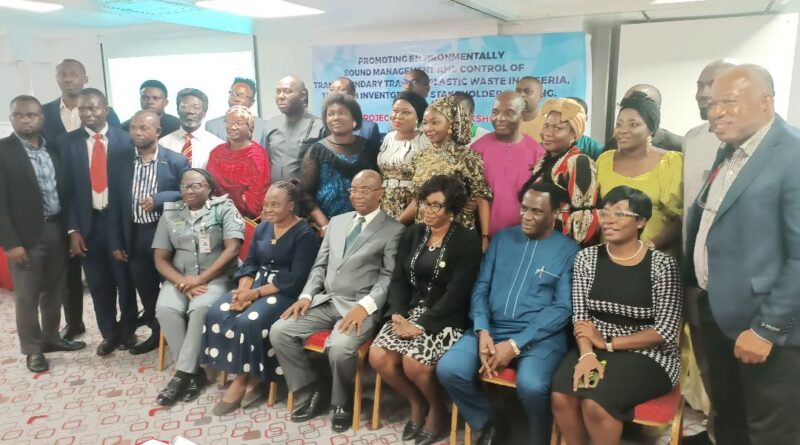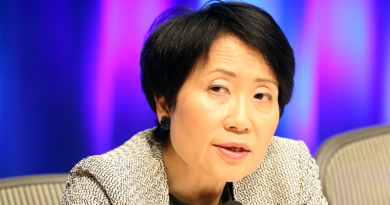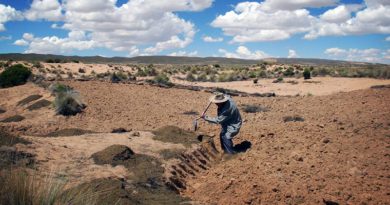Nigeria commits to promotion of sound management of plastic waste
Photo caption: Group photograph of participants at the one-day inception workshop on Promoting Environmentally Sound Management and Control of Transboundary Trade of Plastic Waste in Nigeria held on Wednesday 10th August 2022 in Lagos.
The Federal Government of Nigeria has assured the global community that it’s committed to the programmes aimed at promoting sound management of plastic waste in the environment.
Giving the assurance while declaring open the inception meeting/workshop of the project entitled: “Promoting Environmentally Sound Management and Control of Transboundary Trade of Plastic Waste in Nigeria, Through Inventory and Stakeholder Mapping” on Wednesday 10 August 2022 in Lagos, which is being implemented in Nigeria by the Basel Convention Coordinating Centre for the African Region (BCCC-Africa) under the Small Grants Programmes on Plastic Waste of the Basel Convention, the Nigeria’ s Minister of the Environment, Mohamed Abdulahi, said the Federal Government on its part would provide necessary technical support to ensure smooth take-off and completion of the project.
While commending BCCC-Africa for attracting the project and the Secretariat of the Basel, Rotterdam and Stockholm (BRS) Conventions for awarding the intervention project to Nigeria, he expressed appreciation to the government of Norway through its Norwegian Agency for Development Cooperation (Norad) for providing the funds.
The minister, who was represented at the occasion, noted that plastic waste problem had dominated discourse on environmental pollution at the global level in the last few years.
As a result of this, he said the United Nations Environment Assembly (UNEA) decided to initiate negotiations on global agreement to end plastic pollution (UNEA-5.2), at its fifth session in Nairobi on March 2, 2022.
In an effort to tackle plastic waste problem in Nigeria, the minister explained that the Federal Government had to produce the National Policy on Solid Waste Management, which was approved in 2020 and the National Policy on Plastic Waste Management, which was also approved in 2020.
According to him, in 2021, Nigeria became a member of the Global Plastic Action Partnership (GPAP), a multi stakeholder platform dedicated to translating commitments to reduce plastic pollution and waste into concrete action, adding that the National Environmental Standard Regulation and Enforcement Agency (NESREA) has been working to revise regulations on plastic waste to meet current needs and realities.
These initiatives of government, among others, he stated laid the foundation for other interventions, saying, “It is no surprise that a number of local and foreign development partners have since been making valuable contributions to solving the plastic waste problem in Nigeria including this particular project under the Small Grants Programme by the Basel Convention,” the minister said.
Stakeholders at the inception workshop comprised officials of the Federal and State Governments, ministries, departments and agencies, officials of Nigeria Customs Service, waste managers and regulators, academia, non-governmental organizations and waste recyclers, among others, who expressed concerns over the increasing quantum of plastic waste in the environment.
The plastic waste, they said came from all manner of sources such as packaging and storage of food, drinks and beverages and shopping.
Stating the objectives of the intervention project, Executive Director of Basel Convention Coordinating Center for the African Region – based at the University of Ibadan, Professor Percy Onianwa, said the project aim to promote the environmentally sound management (ESM) of plastic wastes in Nigeria through provision of reliable data on local plastic waste generation rates, and plastic waste trade (import/export), for the enhancement of ESM and control of transboundary movement of plastic waste.
“Establishment of database of local stakeholders involved in the lifecycle of plastics management in Nigeria. This will contribute to effective control of transboundary movement, ESM, and tackling sources of plastic waste,’ he said.
According to the professor of Chemistry at the University of Ibadan, the process would involve the use of a recently-developed toolkit (the BRS-Norad toolkit) that is applicable to developing countries such as Nigeria, explaining that it’s based on material flow analysis.
“The data to be generated will be quantitative and qualitative and is expected to include information on plastic waste generation, recycling, disposal, sectorial and regional contributions, exports, imports, polymer types, etc. The value of such data for national planning cannot be underestimated. The process will also establish a platform for mapping stakeholders in the plastic waste management sector, and engender networking amongst the stakeholders.
“Such a platform will provide a readily available list of national plastic waste stakeholders involved in manufacturing, recycling, regulations, enforcement, academia, collection, disposal, etc. There is no doubt that the resulting networking can cascade into other positive benefits for the nation,” he said.
The professor Onianwa explained further that the project was designed to implement the national inventory of plastic waste in Nigeria and to carry out stakeholders mapping of those who are involved in plastic waste management issues in the country.
“With respect to the inventory of plastic waste, what essentially we have been doing is to estimate the quantity of plastic waste generated within the country and the various components and characteristics of these plastic wastes; from what sector are they coming in; what quantity is going inside recycling; what quantity is going into landfill; what quantity is disposed of indiscriminately? And what quantity is incinerated; which part of the country is most of the waste coming from and other information/ data that is critical because when we want to manage plastic waste, which is a global problem and national problem. We need to clearly understand the nature of the problem and its magnitude. So the inventory will provide information of this nature – I mean magnitude – which will make planning a lot better than what we have today.
“So it is like creating the foundation upon which other project will begin to achieve result for eliminating or reducing this global problem,” the executive director of Basil Convention Coordinating Center for the African Region, said.
The day-long workshop was well attended by key stakeholders in the waste management sector in Nigeria.




